How to clean a driveway: 4 simple steps to make a sparkling first impression
Our tips on how to clean a driveway with or without a pressure washer are just what you need to give the entrance to your home a spruce
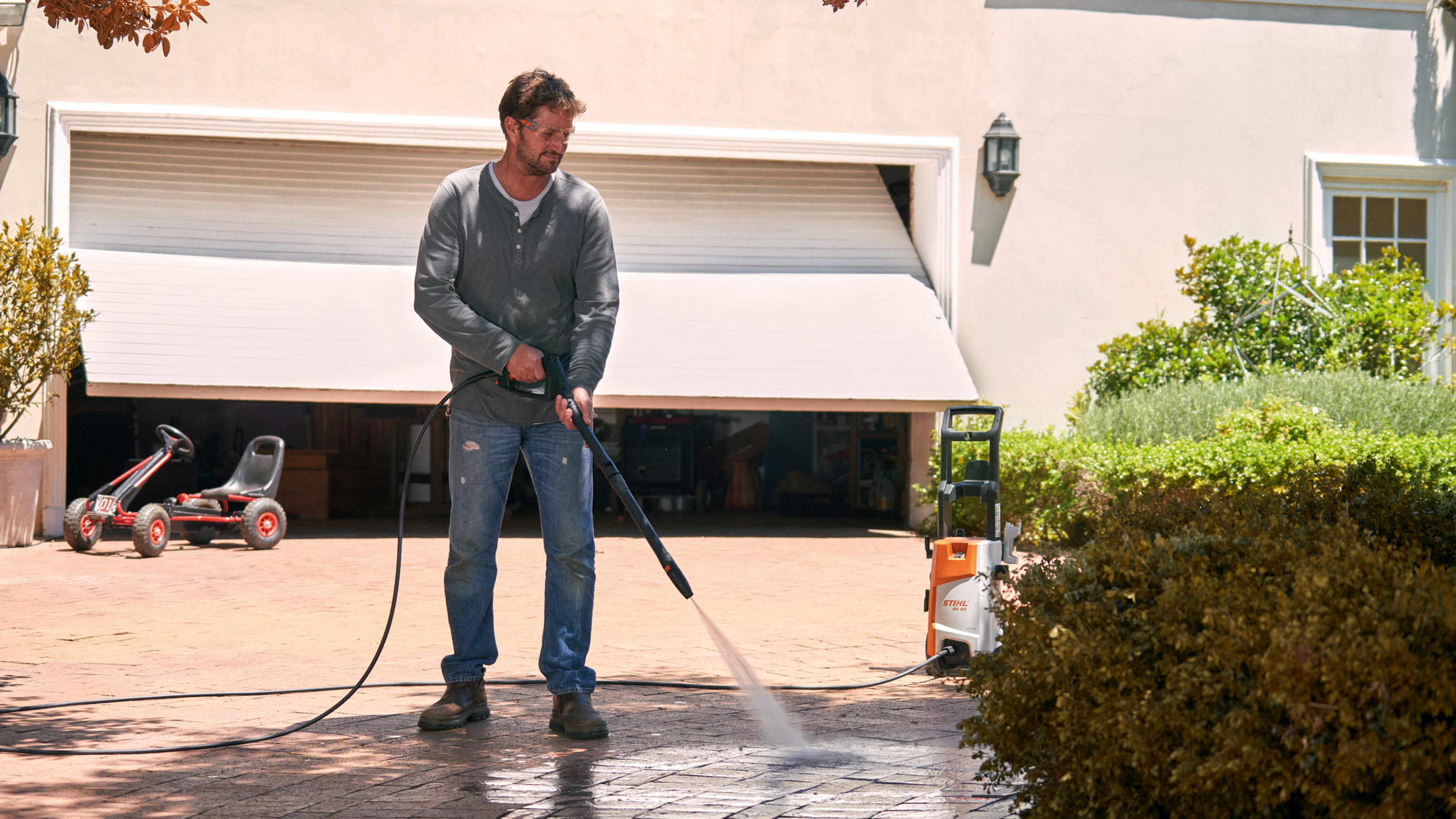

Learning how to clean a driveway is super easy and satisfying once you know how. And, it can make a big difference to your plot's curb appeal.
As the team at Bradstone says, 'It's important to maintain your front outdoor space and driveway, which is the shop window to your home.' But it's not just about impressing your guests – coming home after a long day will feel even more rewarding if you're returning to a neat and orderly entrance.
Whatever driveway ideas you've gone for, keeping the space spick and span is also a good move in the long term. As James Mokler of Kärcher says, 'Periodic cleaning of your driveway, especially after the winter months, will not only help you preserve a brand-new appearance but also will help maintain it, adding years of life and saving you money.'
So what are you waiting for? Our simple step-by-step guide on how to clean a driveway below will get yours looking its best in no time.
An easy guide on how to clean a driveway
It takes just four steps to get your driveway looking as good as new. Plus, we've rounded up extra advice on other common queries, such as how to deal with standing water and stains.
1. Clear the space
'First, move plant pots and garden ornaments out of the way,' says Heather Barrigan, a cleaning expert at MyJobQuote.co.uk.
Then, 'use a stiff broom to brush up dirt and leaves,' she says. 'This will prevent your drains clogging with debris when you wash it down.' You can also use a leaf blower, suggests Paul Hicks of Stihl, to clear away smaller debris such as leaves, rocks, and mulch. 'Spending time doing this will make sure the final results are much more impressive.'
Don't just wait for the big clean to do this, though. Cass Heaphy of Paving Direct explains how 'leaves, twigs, bark, fruit and berries, conkers, acorns, beechnuts, etc., will all leave tannin staining if left on your driveway. You'll need to sweep or leaf blow your paving clear every week or so – like most things, prevention is easier than cure.'
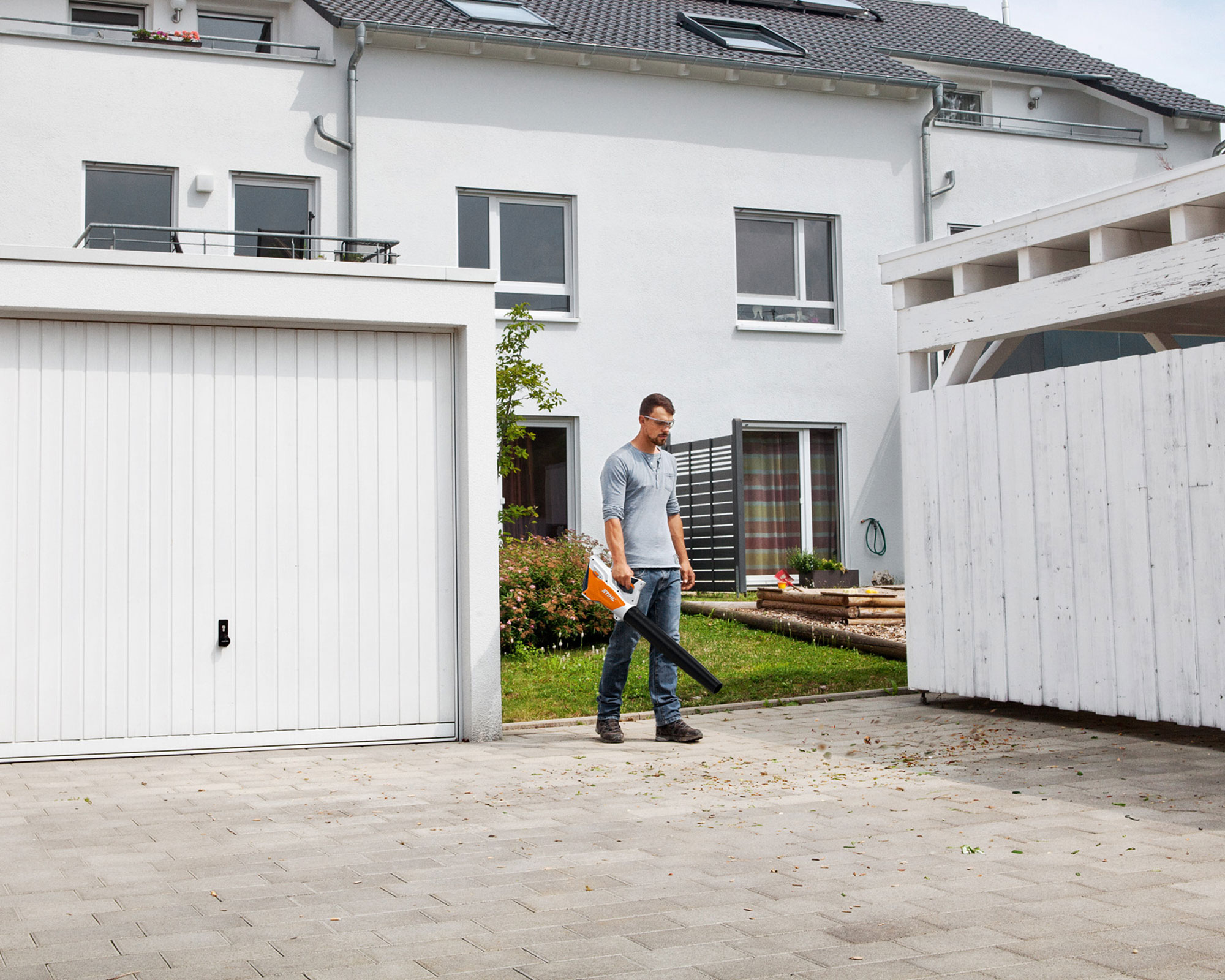
This leaf blower from Stihl will clear a driveway quickly
2. Remove any weeds
The next step is to remove any pesky weeds. 'For hard surfaces such as block paving, pathways, and gravel, a flame gun can be a quick way to combat weeds, requiring minimal effort on your part,' says Bradstone.
'The RHS advises that two applications a week apart work best: one to cause discoloration of foliage and the second to burn the dead leaves,' Bradstone continues. 'However, this works best in dry weather, so you'll need to do this when it hasn't rained for a day or so. Also, approach with caution as flame guns can reach a scorching 2,000 degrees!'
Heather Barrigan at MyJobQuote.co.uk says, 'To remove stubborn weeds and grass growing between pavers, use a garden weeding blade to scrape between the gaps.'
You can also learn how to get rid of weeds using specialist weed killer from any hardware shop or garden center. Alternatively, there are lots more solutions in our dedicated guide.
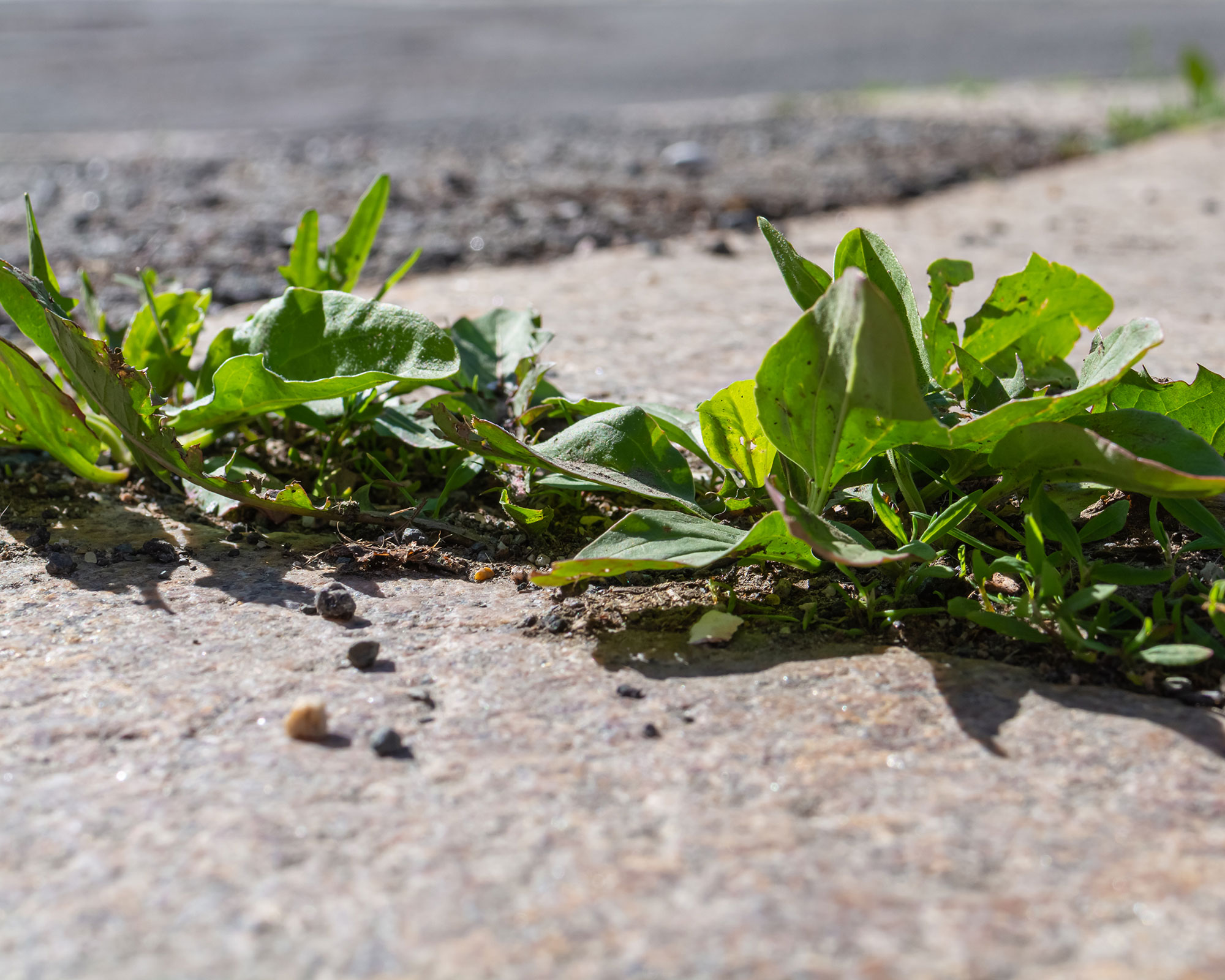
There are lots of easy ways to remove weeds from a driveway
3. Get cleaning
Concrete block paving is very hardwearing, which means it can withstand a light jet washing for a thorough clean with minimal effort, explains the team at Bradstone.
'Although commercial cleaning liquids are available, this is the easiest and safest way to tackle algae and ground-in dirt without the need for chemicals,' says Heather Barrigan. 'To protect surfaces such as unsealed concrete when using high-pressure jets of water, keep the nozzle about 30cm [around 12in] from the ground.'
She continues: 'If you can, choose a warm but not too sunny day to clean your driveway. This will stop the water from freezing or drying too quickly while you work.'
James Mokler of Kärcher recommends starting on a low-pressure setting and engaging the trigger gun away from the surface initially. He advises using a sweeping motion, with each sweep overlapping one another. 'This prevents inconsistent results once dry.'
Need a deeper clean? Paul Hicks of Stihl says, 'Spraying on a cleaning detergent such as stone and facade cleaner before pressure washing can help remove tougher green growth and grime, helping return the stones to their original color and give an extra shine to your patio.'
And if you haven't invested in one of the best pressure washers yet, don't worry. You can still learn how to clean a driveway without a pressure washer. In fact, 'a regular wash-down using a stiff brush or broom is one of the most effective ways of maintaining paths and driveways,' says Bradstone.
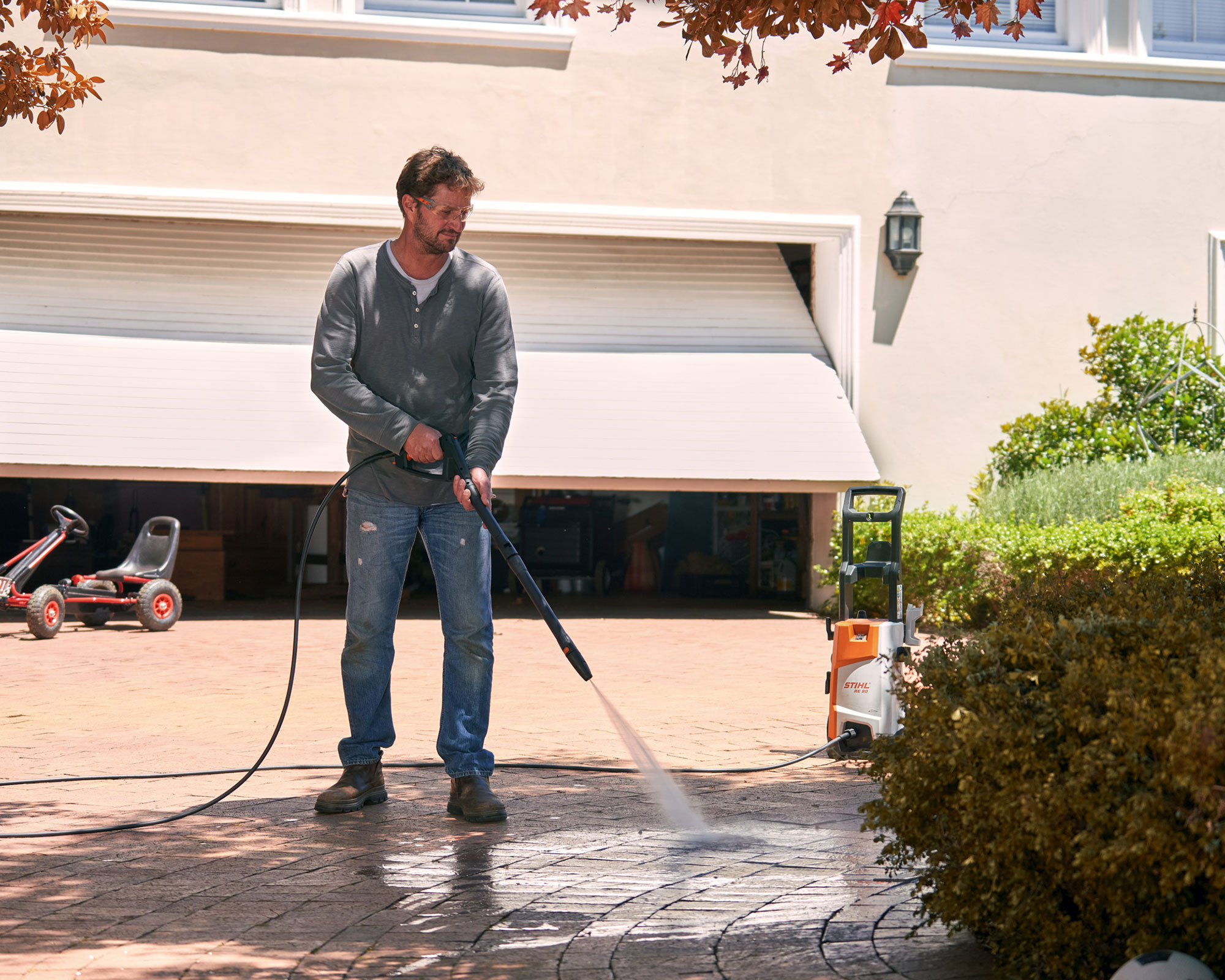
Most driveways can be cleaned with a pressure washer, such as this one from Stihl
4. Add a sealant to protect it for longer
For concrete driveways to withstand harsh weather most effectively, a sealant should be applied every two to three years, says Bradstone. They advise doing this in warm weather, so if yours isn't sealed, make sure to add this to your list of summer jobs this year.
Cass Heaphy of Paving Direct also recommends investing in a sealant to protect driveway paving. He explains how this 'protects the capillaries and stops water and other gunk getting into them, especially in high footfall areas.
'You can use a natural finish sealer, which leaves the paving looking as it was prior to sealing, or a color-enhancing sealant,' Cass continues. 'Before you seal paving, you must clean it properly with an appropriate water-based patio cleaner that actually lifts the dirt and grime out of the capillaries,' he adds. 'Leave the driveway to fully dry and then seal it.
'The sealant will reduce the porosity of the stone or concrete whilst still allowing it to breathe. By sealing the capillaries, many of the inherent vulnerabilities of stone and concrete are significantly reduced. If you seal your paving every couple of years you will extend its lifetime and keep it looking in tip-top condition, saving you money in the long term.'
This is a useful tip if you need to know how to clean a patio, too.
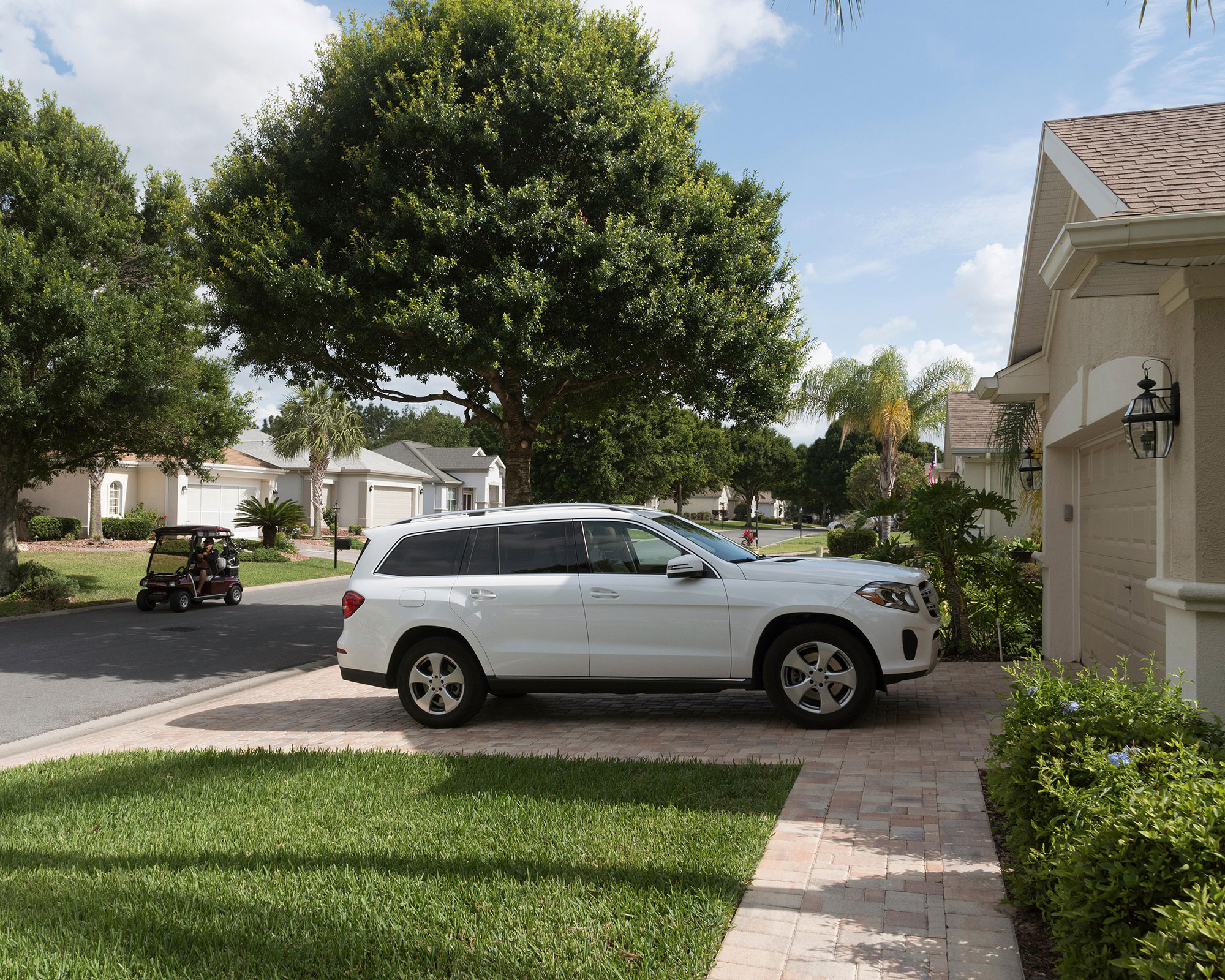
Sealing your driveway will help it look good for longer
How do you clean a gravel driveway?
Wondering how to clean a gravel driveway? You may be pleased to know that it's not as tricky as it may first appear.
Weeding is just the same as with paving – you can choose to hand-pull them (push the gravel to one side to make this easier to get them by the roots), use a flame weeder, or use a commercial weed killer.
When it comes to cleaning, some homeowners still use their trusty pressure washer. The trick is not to aim it directly at the stones and keep it on a low setting and it will give the surface a good clean. As always when using a pressure washer, wear safety goggles and protective clothing to avoid contact with any flying stones or debris.
Alternatively, you can create a sieve from an old wheelbarrow with holes drilled in the bottom. Use this to rinse your gravel before returning it to your driveway. Be warned though, this is a more time-consuming approach.
Also, remember that you will need to top up your gravel from time to time. Just this process alone will give the space an instant refresh.
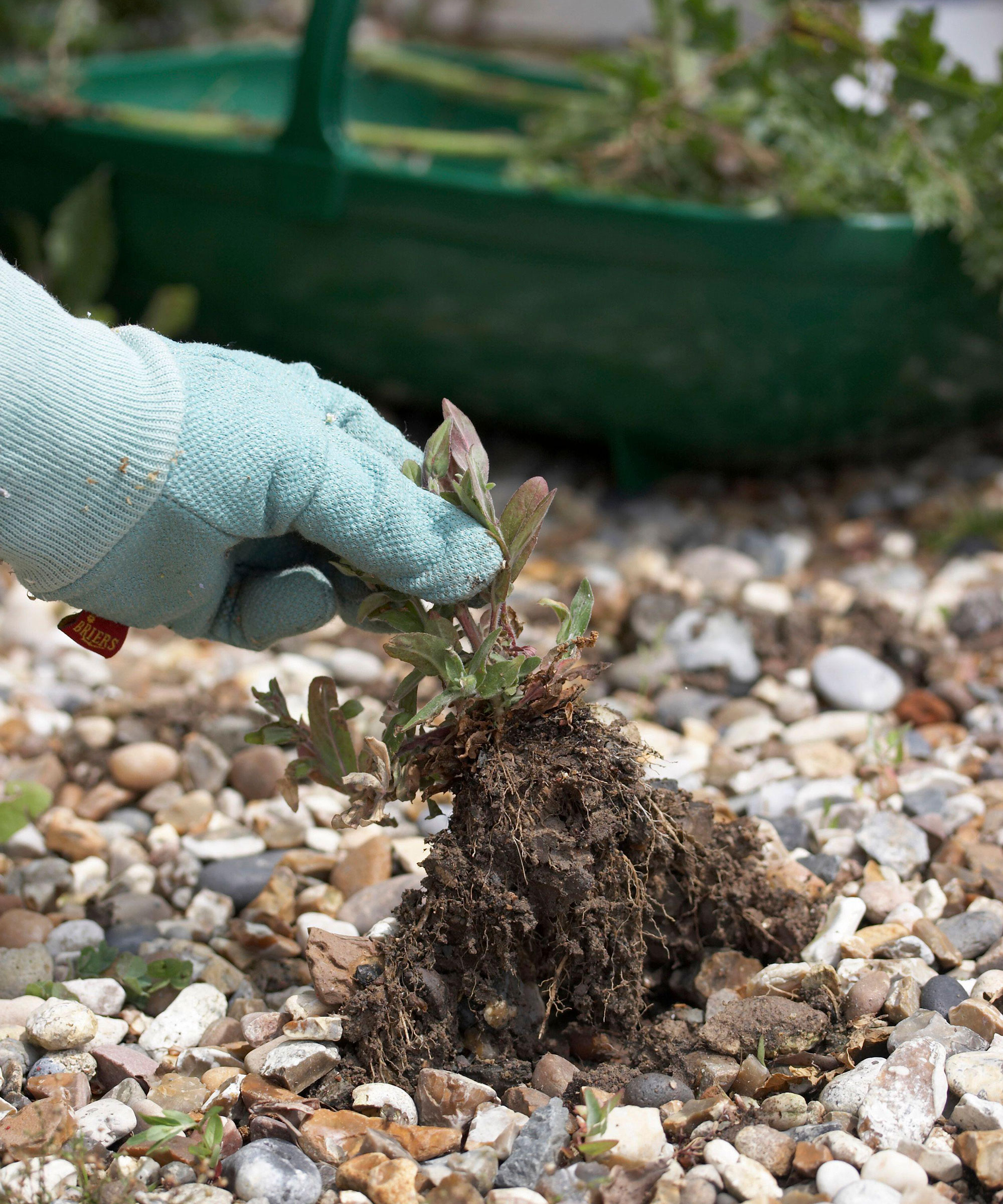
You can weed a gravel driveway by hand, or use a tool
How do you remove stains from a driveway?
Cass Heaphy explains how concrete and block paving driveways are porous. 'This makes the surface material susceptible to organic blemishes and growths such as black spots, algae, and lichen, which enter the paving as microscopic spores.' These then germinate and grow rooted within the concrete's capillaries, he says. 'To remove these growths, you can either use a specialist driveway cleaning product or black spot and algae remover.'
But other stains can occur on driveways. 'If you have iron or steel garden furniture where coatings have abraded on the feet, be aware that contact rust can occur on your paving,' Cass continues. For instance, maybe you have one of the best garden benches positioned to the side of your driveway for watching the world go by. 'The best solution is to re-coat the feet or winter-store it in your shed or indoors if you can, to prevent it staining your paving,' he says.
'For difficult stains such as engine oil, use an absorbent material such as loamy garden soil, sawdust, or cat litter to soak up the spill,' suggests Heather Barrigan at MyJobQuote.co.uk. 'Leave it for as long as possible before brushing up (12 to 24 hours is ideal). Then, dissolve a scoop of washing powder in hot water to wash away the remaining stain.'
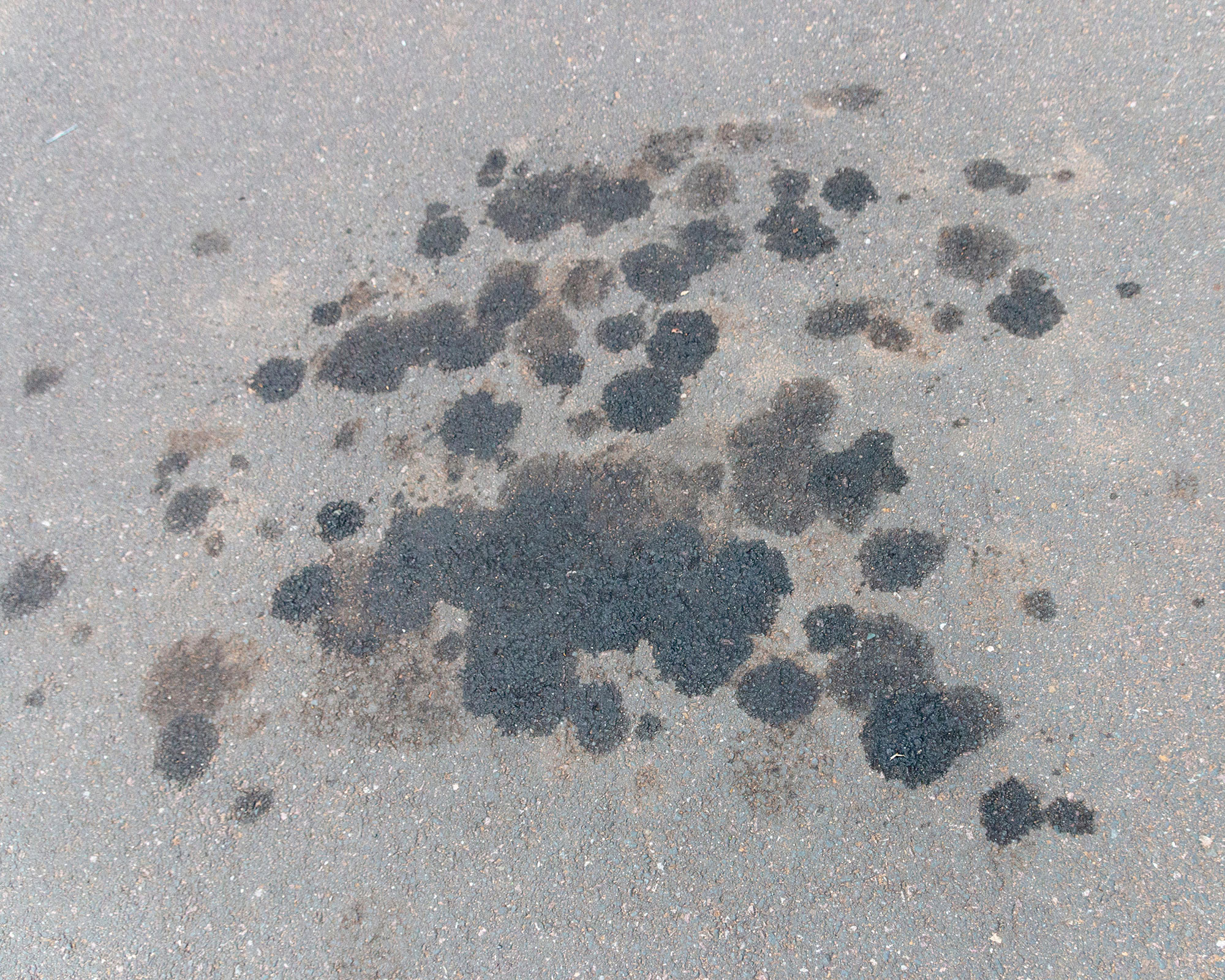
There are steps you can take to remove oil stains on a driveway
How do you get rid of standing water on a driveway?
'Your driveway should have a fall (1/60–1/80 gradient) which should ensure water drains into your soak-away area,' says Cass. 'However, if you do have standing water for some reason, use a yard broom to disburse it and sweep it into your soak-away area, i.e., a lawn or drain.' It's as simple as that!
Need some permeable garden tips to deal with excess rainwater? Our guide has you covered.

Driveways should be on a slight slope to help with drainage
What should you avoid when cleaning a driveway?
'Don't use acid or salts,' advises Cass. Both acid-based cleaning solutions such as diluted vinegar (or, even worse, brick acid) and salts such as gritting salt can damage the surface of stone or concrete block driveways, he says. 'They both have corrosive properties, and safer cleaning products appropriate for these materials should always be used.'

The garden was always a big part of Holly's life growing up, as was the surrounding New Forest where she lived. Her appreciation for the great outdoors has only grown since then. She's been an allotment keeper, a professional gardener, and a botanical illustrator – plants are her passion.
